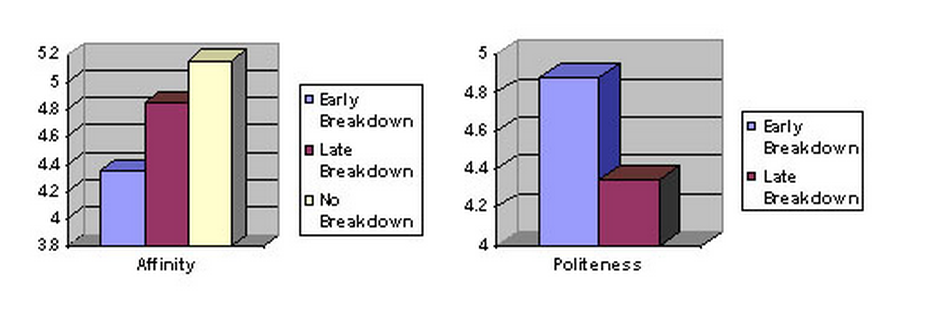Media Effects Research Lab - Research Archive
If you don't have anything nice to say...:
Student Researcher(s)
Veena Raman (Ph.D Candidate);
Meghan Sanders (Ph.D Candidate);
Patty Michael-Wharton (Ph.D Candidate);
Jennifer Warren (Ph.D Candidate);
Faculty Supervisor
FOR A COMPLETE REPORT OF THIS RESEARCH, SEE:
Raman, V.V., Sanders, M. S., Michael, P. W., & Warren, J. (2004 May). If you don't have anything nice to say...: The effect of systems breakdown on human-computer interactions. Paper presented to the Communication and Technology Division at the 54th annual convention of the International Communication Association (ICA), New Orleans, LA.
INTRODUCTION
As computer technologies evolve, they appear to be seamlessly merging into individuals’ everyday lives and experiences. Research has indicated that human-computer interactions (HCI) are fundamentally social and natural, similar to human-to-human interaction in real life. If users treat computers socially, then there is a strong possibility that users may not function to their fullest potential at work or at home if they encounter a negative interaction (i.e. computer breakdown). While good implementations of technologies mimicking human characteristics can generate social responses, most technologies are still susceptible to breakdowns. Errors made by computer systems are unlike any that a human would make. Do breakdowns make salient the idea that the computer is a medium and interrupt the user’s orientation toward the computer as a source? This study examines the effect of system breakdown on the social responses exhibited by individuals towards computers and how predispositions affect these responses.
RESEARCH QUESTION
Specifically, we asked the following research question:
RQ1: What is the relationship between affinity seeking and affinity, and affinity seeking and politeness?
RQ2: What is the relationship between computer breakdown and politeness, and breakdown and affinity towards the computer?
RQ3: Will frustration serve as a mediator between the effect of computer breakdown and politeness in rating the computer?
METHOD
A within subjects repeated measures experiment was conducted in order to investigate these questions. A total of 88 (48.9 % male, 51.1% female) participants were first randomly assigned to one of three different versions of a clip set which were designed to reflect three types of characters – hero, villain, and ambiguous, and which contained a movie synopsis, video clip, and screenplay excerpt. Each clip set consisted of each character portrayed by three different actors. For example, a participant may have seen Michael Keaton portray a hero, Aidan Quinn portray an ambiguously-valenced character, and David Duchovny portray a villain. In a different clip set, a participant may have seen Aidan Quinn as the hero, Michael Keaton as the villain, and David Duchovny as the ambiguously-valenced character. Each actor portrayed all three character types. In each of the three versions, the storyline, names, and actions of the character were changed to reflect the roles of hero, villain, and ambiguous characters. After exposure to one of the three versions of the clip set, participants were asked to respond to scales measuring their identification with and enjoyment of the three types of characters.
RESULTS
RQ1: Affinity-seeking significantly affected affinity for the computer but not politeness towards it. However, affinity-seeking stopped being a significant predictor when levels of investment, involvement and frustration were taken into account. Nor was it significant when the difference between pre- and post affinity ratings were taken into account.
RQ2: Participants in the control or no breakdown condition exhibited significantly more affinity for the computer than did the early breakdown participants and the late breakdown participants. Politeness also differed significantly by condition, such that participants in the early breakdown condition were more polite than those in the late breakdown.

RQ3: When investment, frustration and involvement were taken into account, condition exerted a significant influence on affinity. In addition, condition also had a strong effect on frustration, such that participants in the early breakdown condition were more frustrated than in the late and control conditions. These results suggest that frustration is a mediator for predisposition's effects on affinity towards the computer, but not a person's politeness levels.
CONCLUSION
The results of this study indicate that social responses to computers did change as a result of the system’s breakdown, but only in terms of affinity. However, people were polite and exhibited affinity even in the conditions where there was a breakdown. This might be due to the fact that giving quick feedback can decrease uncertainty and promote positive affect, even when errors occur. Additionally, the difference in and the direction of affinity between early and late breakdown conditions could also be a result of a shift of the computer from a ready-at-hand to a present-at-hand state, meaning that people do not see the computer as a tool (ready-at-hand) until it commits an error, making its tool status extremely salient (present-at-hand). Since affinity-seeking was found to affect affinity but not politeness, it is possible to contend that people are able to satisfy certain interpersonal needs through interactions with computers.
Given that computers are not yet error free, the findings of the study are of importance in understanding the psychological and cognitive processes involved in encountering computer breakdowns while attempting to complete a task.
For more details regarding the study contact
Dr. S. Shyam Sundar by e-mail at sss12@psu.edu or by telephone at (814) 865-2173

